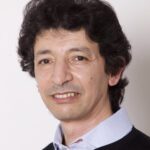Lien vers Pubmed [PMID] – 10760300
Proc Natl Acad Sci U S A 2000 Apr; 97(8): 4333-8
Mutations in the potassium channel gene KCNQ4 underlie DFNA2, an autosomal dominant form of progressive hearing loss in humans. In the mouse cochlea, the transcript has been found exclusively in the outer hair cells. By using specific antibodies, we now show that KCNQ4 is situated at the basal membrane of these sensory cells. In the vestibular organs, KCNQ4 is restricted to the type I hair cells and the afferent calyx-like nerve endings ensheathing these sensory cells. Several lines of evidence suggest that KCNQ4 underlies the I(K,n) and g(K,L) currents that have been described in the outer and type I hair cells, respectively, and that are already open at resting potentials. KCNQ4 is also expressed in neurons of many, but not all, nuclei of the central auditory pathway, and is absent from most other brain regions. It is present, e.g., in the cochlear nuclei, the nuclei of the lateral lemniscus, and the inferior colliculus. This is the first ion channel shown to be specifically expressed in a sensory pathway. Moreover, the expression pattern of KCNQ4 in the mouse auditory system raises the possibility of a central component in the DFNA2 hearing loss.


